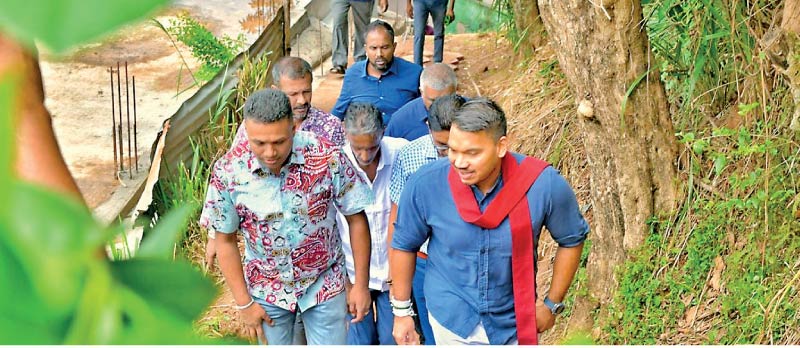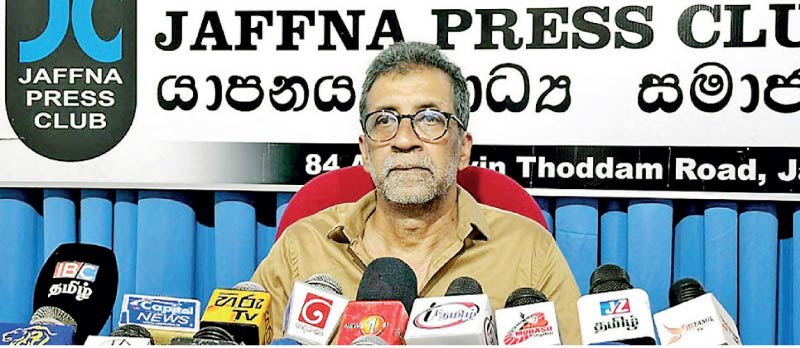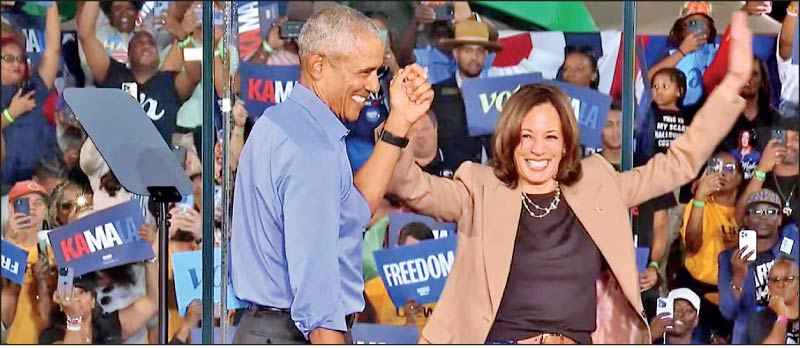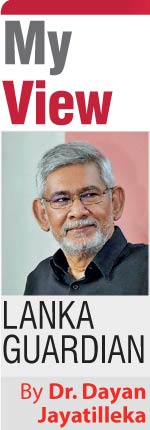Wednesday Feb 25, 2026
Wednesday Feb 25, 2026
Thursday, 31 October 2024 01:31 - - {{hitsCtrl.values.hits}}

Namal’s SLPP moves up

LTTE Co-founder Raghavan reveals Prabhakaran

Why Kamala Harris must win
 On the campaign trail, President AKD followed-up his memorable line “I hear talk in certain places about an Opposition. An Opposition? No. What we need now is a powerful Government!” with a no less memorable and ominous one: “They think this government will be short-lived but I’m telling you this Government will step down only after having rebuilt the entire country!”
On the campaign trail, President AKD followed-up his memorable line “I hear talk in certain places about an Opposition. An Opposition? No. What we need now is a powerful Government!” with a no less memorable and ominous one: “They think this government will be short-lived but I’m telling you this Government will step down only after having rebuilt the entire country!”
He should have said “this government will step down only if you decide it should at a national election”.
Meanwhile senior JVP member and NPP candidate Samantha Waidyaratna reassured his audience and the nation on TV news that “the incoming Government will last an aeon (‘kalpayak’)”.
Elpitiya elaborated
Elpitiya was a legendary JVP stronghold during the April 1971 insurrection and thereafter. Therefore, last week’s Elpitiya PS election weeks after Anura Kumara Dissanayake’s presidential victory, illuminates greatly.
 The JVP-NPP has shrunk slightly (47%) in comparison with its Elpitiya vote in September (49%).
The JVP-NPP has shrunk slightly (47%) in comparison with its Elpitiya vote in September (49%).
 The JVP-NPP has risen beyond AKD’s 42% (nationally) to 47% (locally), but still lags behind the magic 50% and did so even in Elpitiya in Sept (49%). Despite the ‘honeymoon’ with a new president, and in a favourable locale, the majority remains unconvinced.
The JVP-NPP has risen beyond AKD’s 42% (nationally) to 47% (locally), but still lags behind the magic 50% and did so even in Elpitiya in Sept (49%). Despite the ‘honeymoon’ with a new president, and in a favourable locale, the majority remains unconvinced.
 The SJB (22%) has shrunk by 5% from Sept (27%).
The SJB (22%) has shrunk by 5% from Sept (27%).
 Nobody has grown, everybody has shrunk, some have been eliminated-- except one party.
Nobody has grown, everybody has shrunk, some have been eliminated-- except one party.
 The SLPP (‘Pohottuwa’) has increased by 6.3% from roughly 2.5% (nationally) in Sept 2024 to almost 10% (Elpitiya), multiplying by a factor of 3. That’s an impressive growth-rate.
The SLPP (‘Pohottuwa’) has increased by 6.3% from roughly 2.5% (nationally) in Sept 2024 to almost 10% (Elpitiya), multiplying by a factor of 3. That’s an impressive growth-rate.
Mahinda, Namal and the SLPP were/are encircled and reviled by the JVP-NPP, the SJB, ‘Gas cylinder’ guys, and Dilith’s dynamos. For a party supposedly on the verge of extinction, Elpitiya marks a dramatic recovery, a resurrection of sorts. If that growth-rate is extrapolated, come 2029, the new Namal may be the new normal.
Given Wasantha Samarasinghe’s repeated assertions, the JVP-NPP aims to keep him locked in litigation and jail. It may seek to emulate what has been done to Imran Khan or what President JR Jayewardene did to Madam Sirimavo Bandaranaike—remove the challenger from the electoral race.
Let’s hope the JVP never returns to the ‘Vijaya Kumaratunga deletion option’ which it exercised just before the Western Provincial Council election of 1988, and has never repented.
Zionist zones, conflict importation
There’s an Israeli movie of three IDF soldiers in Arugam Bay, working-off post-combat trauma caused by the death of a member of their unit in an incursion into Lebanon. (https://www.facebook.com/share/p/fcVEpuqbm7fnVmoY/)
Three young anti-racist politicians whose integrity I trust, occupying opposite ends of the politico-ideological spectrum, former Mayor of Weligama Rehan Jayawickrema (SJB) and Pubudu Jayagoda and Duminda Nagamuwa (FSP/People’s Struggle Alliance) have blown the whistle on Israeli incursion. Nagamuwa accused Sri Lankan authorities of permitting “rest-and-recreation” for IDF soldiers engaged in a genocidal war (a charge proven by the movie).
Here are 10 questions from me for the AKD-Harini administration.
1. Why build synagogues (including in Dehiwela?) in a country without a Jewish population, unless Zionist zones--”Little Israels”--are to be allowed to mushroom in our country?
2. What does it do to the hearts and minds of young Sri Lankan Muslims who witness on TV and social media every day, the gruesome massacres of fellow Muslims-- overwhelmingly women and children-- by the IDF in Gaza and Lebanon, to see the Star of David exhibited here, and know that there are concentrations of fanatical young Israelis who paste posters of IDF soldiers on streets, walls and shops of Sri Lanka?
3. Won’t young Sri Lankan Muslims who have refrained from posting tributes to Hamas, Yahya Sinwar or Hezbollah on walls and shops, feel alienated from the Sri Lankan state which callously permits, facilitates and safeguards the display of Zionist militarism which causes such deep hurt and humiliation?
4. Who in authority opened the floodgates for those who openly celebrate war criminals and prosecutors of a genocidal war, in this country which opposes the Gaza war and has a Muslim minority?
5. While Russian and Ukrainian tourists in Sri Lanka do not advertise their military symbols despite it being wartime back home, who gave permission for Israeli tourists/temporary residents to exhibit their fanatical ideology in public spaces?
6. Who gave permission for the importation and proliferation of a ‘conflict-vector’; a provocative cause and carrier of radicalisation, militancy and possibly terrorism, in our country which has experienced decades of violent conflict?
7. Why is President Anura Dissanayake seemingly oblivious to such an obvious threat to National Security, reducing it to providing security for tourists?
8. Why doesn’t he order the Police and military to immediate remove all pro-IDF and Zionist symbolism currently on public display in Sri Lanka?
9. Doesn’t AKD care about the damage to Sri Lanka’s prestige caused among the world’s youth and the Islamic countries who are against genocide in Gaza, by the welcome extended to Israelis who may have participated in and/openly support that genocide?
10. Why can’t President Anura Dissanayake do the equivalent of what a UNP leader, President Ranasinghe Premadasa did when he shut down the Israeli Interests Section and followed it up with a Presidential Commission to investigate Mossad activities?
President Premadasa also voted against the successful attempt in 1991 by US President George HW Bush, to repeal the UN General Assembly resolution of 1975 declaring Zionism as a form of racism. Sri Lanka was one of 25 states to do so and the only one without a Communist or Islamic leadership.
By contrast, President Anura Dissanayake’s Sri Lanka was not among the 105 signatories denouncing Netanyahu’s declaration of UN Secretary-General Gutteres persona non grata, when the letter was handed in to the UNSG’s office on October 10th. Sri Lanka requested the letter back and signed it only on the next day, October 11th, after the story surfaced in Colombo.
Then again, no Ceylonese/Sri Lankan leader, whatever his/her ideological persuasion, would have passed up the chance to attend the BRICS Plus Summit and stand with the world’s majority-- especially in the wake of his election to the presidency-- but AKD did, not even sending his PM or Foreign Minister, only the Foreign Ministry’s top official. Even Sir John Kotelawala attended the Bandung Summit while JR Jayewardene as NAM chairman warmly handed the gavel to Fidel Castro at the 6th summit in Havana in 1979.
|
Israeli military veterans’ story
|
Kamala Harris must win
I unhesitatingly and wholeheartedly support a Kamala Harris win and it isn’t primarily because of her upbeat personality and movie star appeal. It is because she is rational and progressive, while Trump is proto-fascist and “unhinged”.
I cannot imagine that any person of reason and goodwill who supports democracy, can vote for Donald Trump who sounds angrier, crazier and more xenophobic by the day. But the contest is scarily close and he might become president. That may be good for Russia-Ukraine, but will only encourage Netanyahu’s butchery and expansionism in the Middle East. Harris will try to stop the carnage in Gaza and Lebanon.
Trump’s former chief-of-staff John Kelly disclosed that Trump had mused “ why can’t my Generals be like Hitler’s?” and logically concluded that Trump was a fascist—as had former Chairman/Joint Chiefs of Staff, General Mark Milley (“ he’s fascist to the core”). Harris endorsed the definition at a Town Hall meeting. When CNN’s Anderson Cooper asked her “Do you think Trump is a fascist?” she looked right into his eyes and answered in a heartbeat: “Yes, yes I do”.
We had a similar experience when on Gotabaya Rajapaksa’s 59th birthday a senior Buddhist monk delivered a sermon in which he piously recommended that Gotabaya should be a Hitler. President Sirisena denounced the reference. I did so on my regular TV show and in the press on June 22nd 2018. (https://www.colombotelegraph.com/index.php/be-a-hitler-the-dark-matrix-that-can-destroy-sri-lanka/) Aghast at the Hitler reference, Mahinda was rushing to have it contradicted by clergy when Gotabaya quickly came to the monk’s defence, attacking critics. Later, Dilum Amunugama endorsed the “Hitler” idea.
Raghavan’s revelation, history’s revaluation
Two civil wars, North and South, were the great dramas and driving forces of Sri Lanka’s contemporary history. They divided us then and continue to divide us today, though mutedly.
The main issue is whether those wars should have been fought to a finish as they were. Was there another way? Shouldn’t every Government have persisted open-endedly in the negotiation effort despite the LTTE’s obduracy and aggression? Should the Sri Lankan state not have continued with the Norwegian effort at whatever cost? Was it right for Mahinda to have made the decision to defeat the LTTE militarily?
There were four streams within what we may call the ‘War camp’.
Stream 1. Tigers who wanted nothing less than a military victory over the Sri Lankan state and the establishment of Tamil Eelam through war.
Stream 2. Sinhala chauvinists who wanted to defeat the LTTE because it was a Tamil secessionist organisation.
Stream 3. Patriotic Sri Lankan statists, who may or may not have been Sinhala nationalists, who felt impelled to defeat a ferocious, formidable armed threat to the country’s territorial unity and integrity. In world history, Abraham Lincoln would be the paradigmatic example.
Stream 4. Southern and North-Eastern leftists --Sinhala, Tamil, Muslim, Burgher and mixed ethnicity, who realised there could be no other solution to the LTTE’s war, not for ethno-national or ethnoreligious reasons, but given the exceptional, intrinsic, irreversible nature of Velupillai Prabhakaran and the LTTE.
My books Travails of a Democracy (Vikas, New Delhi 1995) and Long War, Cold Peace (Vijitha Yapa, Colombo 2014) elaborated the argument of Stream 4 (of which I was a prominent, indicted, activist) which I had carried into and combined with Stream 3, working with presidents Premadasa and Rajapaksa, and as wartime Ambassador/PR to the UN, Geneva.
Sri Lanka’s postwar crisis --and it IS a postwar crisis, not a post-Independence one as the JVP-NPP absurdly asserts--is sourced in Stream 2 deadlocking, dominating and defeating Stream 3.
Decades later, the jury is in, on the war.
One of the smartest—both intelligent and stylish—periodicals on the island is the Jaffna Monitor (JM). The cover story of its latest issue is an exclusive, extended interview with one of the co-founders of the LTTE, a man who knew Prabhakaran closely, dissented, and survived to tell the tale. It is illustrated with excellent closeups by Santhagunam. Raghavan deserves a Netflix documentary if not a ‘biopic’ movie. We met in Paris and had a long conversation over a meal, a decade ago.
He was recently in Sri Lanka. The JM interview should be read by everyone, and translated into Tamil and Sinhala.
Raghavan’s quote on the cover of Jaffna Monitor October 15th 2024 tells the story:
‘By the Early 1980s, Prabhakaran Saw Himself as a Divine Incarnation, Justifying His Killings as Part of His Dharma’ - Exclusive Interview with LTTE Co-Founder Ragavan
From the interview we learn about:
(a) Prabhakaran’s self-image, mindset, project and praxis.
(b) Prabhakaran’s ideology, sources of inspiration, role models.
(c) The collective attitude of the Tigers and most former Tigers.
Key extracts from a 12-page interview (Part-1 of a multi-part series) follow, accompanied by my interpretations.
“…His refusal to allow alternative movements also meant he did not tolerate differing ideas within the LTTE itself. For instance, if someone said, ‘I want Tamil Eelam, but I disagree with the methods of the LTTE,’ Prabhakaran believed that person was not a suitable candidate. If an LTTE fighter or sympathiser agreed with the principle of self-determination but had some criticisms of the LTTE’s methods, Prabhakaran believed that person had no place and should be eliminated. This mindset led the LTTE to commit thousands of murders in the name of the Tamil cause. It was Prabhakaran’s intolerance of dissent or differing opinions that resulted in these massacres.
No one could say, ‘I am loyal to the Tamil Eelam cause or the LTTE, but I disagree with Prabhakaran’s methods.’ If someone did, Prabhakaran believed they had to be sidelined, silenced, or eliminated. To him, there was no distinction—Prabhakaran and the LTTE were one and the same. Loyalty to him became synonymous with loyalty to the cause.
By 1980 or 1981, Prabhakaran had already begun to see himself in that light. In his mind, anything that aligned with his will was justified. For him, it wasn’t just about personal preferences—it was about serving a higher purpose. He started to believe that those who opposed him were not merely disagreeing with him but obstructing this higher purpose, and therefore, they had to be eliminated. For Prabhakaran, Tamil Eelam—or even the LTTE itself—was secondary. In his view, he was Tamil Eelam; he was the LTTE…” (Jaffna Monitor, October 15th 2024, pp. 10-22.)
Interpretation: This reveals Prabhakaran’s mindset which included murderous suppression of dissent within the LTTE and competition within the Tamil Eelam movement as a whole, amply proving that what the state was facing was a totalitarian enemy, with whom no negotiated settlement short of total surrender was possible.
“In fact, Prabhakaran was a follower of V. Navaratnam and was inspired by the establishment of Israel by the Jewish people, without understanding the settler colonial project behind it…
…He also believed in Adolf Hitler’s authoritarianism and Zionist exclusivism. His worldview was a complex mixture of right-wing ideologies. Over time, this belief grew stronger, and he began to see himself as almost a divine incarnation, acting under a higher purpose. His actions, including eliminating dissenters, were justified in his mind as part of his Dharma.” (Ibid).
Interpretation: This unmasks Prabhakaran’s ideological fusion of Hitler fascism and Zionism. His ideology suffused the movement, determining the character and conduct of the LTTE. After a point, Prabhakaran/LTTE were NOT classifiable simply or primarily as “national liberation” leader/movement.
“…Even today, if you speak to former LTTE members, many will say, “Annan (Prabhakaran) never made mistakes.” For them, the idea that Prabhakaran could have erred or been vulnerable to mistakes is unimaginable. This strong belief system grew both within him and within the organisation. Ultimately, this unwavering conviction— where no dissent or alternative views were tolerated or even considered—led to his downfall and the destruction of the LTTE at Nandikadal Lagoon.” (Ibid)
Interpretation: This confirms the fanatical attitude that the LTTE and even former members of the LTTE continue to have, which still dominates the Tamil Diaspora and Tamil Nadu. Though there is no longer a Tiger quasi-state, there is a Tiger state of mind.
Conclusion
(I) The fusion of these three factors—Totalitarianism, Fascism, Fanaticism-- made the Nandikadal outcome the only possible one. It was also desirable, positive and progressive.
(II) This triple combination makes a settlement with the dominant Diaspora element impossible and any physical contiguity between Sri Lanka and Tamil Nadu an existential danger.
(III) Endorsing the post-9/11 Afghanistan war while condemning the 2003 Iraq invasion, Barack Obama declared “the only Just War is a necessary war”. Sri Lanka’s last war was necessary and inevitable, and therefore a Just War. History will absolve the Sri Lankan state (and Mahinda Rajapaksa).